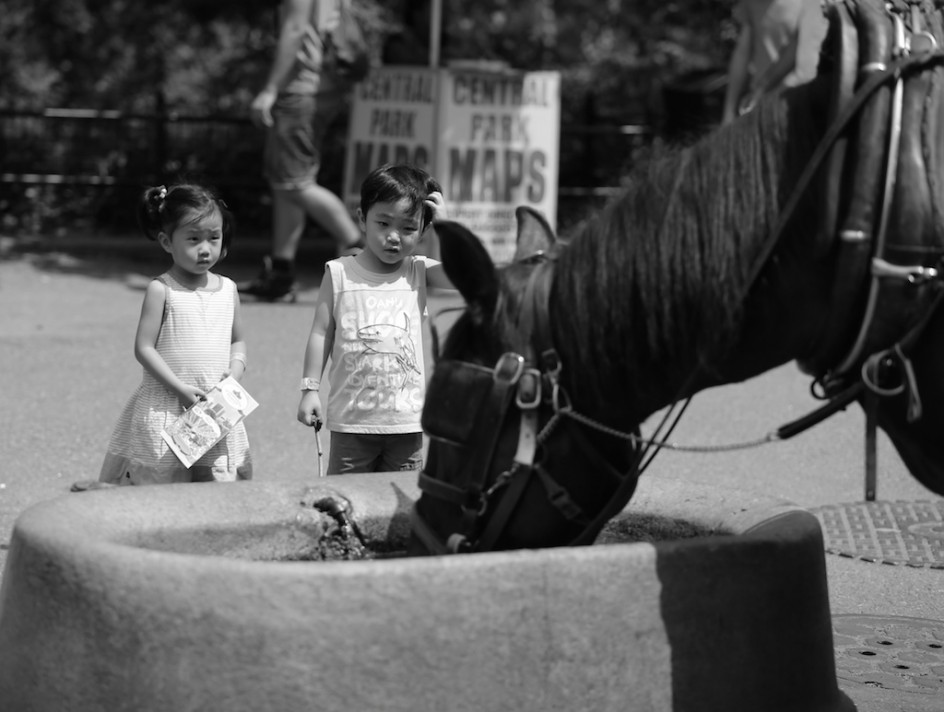
When people tell me they want to understand what is at stake in the New York Carriage Horse Controversy, I suggest they go to Central Park and stand by the water fountain installed by the S.P.C.A. at the park entrance and watch the faces of children as the horses come by to drink. Here, every carriage horse driver stops and the horses take long deep drinks of the cold and fresh water.
The children are, to a one, mesmerized. The bold ones come closer, pat the big horses on the forehead, the shy and timid ones simply can’t take their eyes off of them, they look to their parents in disbelief. The lucky ones get to go in the carriages and take a ride.
It is a curious characteristic of this conflict that the people most affected by it – the horse owners, the drivers, the children, the lovers, the tourists, the animal lovers – are invisible in the debate, powerless. They are voiceless, never spoken to, heard from, interviewed or considered. All around them, politicians and millionaires, ideologues and people who call themselves supporters of animal rights talk about the horses – what they want, what they need, how they feel. And they never seem to really know.
But no one ever asks the people closest to the animals what they want, what they need, how they feel. In this kind of twisted democratic process you have to have money to be heard by or talk to the mayor or the members of the City Council who will soon vote on whether or not to ban the horses.
If you asked the children, the tourists, the lovers, the drivers, you would not hear that the horses are abused. Or that they do not belong in New York. Or that they are a dangerous menace to poor and hapless tourists. Or that they are sad or that their lungs are turning black from exhaust fumes or that they are starving, overworked and mistreated.
You would hear a very different story, you can see it in their faces, their wide eyes, their enchantment. The horses are big, beautiful, strong, gentle, at home in on the paths and bridges of a vast park that was built for them. In our world, you either feel the magic of the horses or you don’t. You will either see the horses as piteous creatures in need of rescue or as something more, something much bigger. The people who feel the magic – the kids, the Irish drivers, the lovers who come from all over the world to hug and kiss in the carriages – don’t seem to count in this debate, nobody seems to care what they think or ever asks them. The people who get to talk the most about the horses are the angry ones, there is no crisis and mystery in their voices or tales, only rage and cruelty.
And what of these children? What if the horses are banned? What do the children mean? How much do they count for? The imagination of a child is raw, open, pure, innocent. The sight of a horse can plant a radioactive seed, a powerful memory, an image that can alter a life.
If you stand by the park and wait for the children, their story will touch your heart, their eyes will say what they are not allowed to say or do not yet have words to say. If the horses are banned from the city, so much of the magic and mystery of life will disappear with them, the children will never see them again, never get to stand by the fountain, look into the horse’s eyes, touch them, rub their coats, look up at their parents in wonder. If they are lucky, the drivers will hand them a carrot – almost all of the drivers have carrots – and the children’s lives will change forever. They will pass through a portal to the natural world, the mystical world of the horses, who have been around children for thousands of years and seem to know how to be gentle around them.
No carriage horse has ever harmed a children in 150 years of pulling carriages through the park. It is impossible to know just how much light has been brought into the hearts and imaginations of children in that time. It is not possible to be know what will be lost if the children of the future come to stand and look instead at vintage electric cars. So many adults have talked to me and messaged me about the first time they saw a carriage horse, what it meant to them, an ecstatic memory in a fragmented and disconnected world.
Just as we must speak for the animals in the world who cannot speak for themselves, so we must speak for the children, who also depend on us. We owe them their imaginations, we owe them magic and mystery, we owe them the presence of things that will open their eyes and hearts to the true nature and promise and history of the world.
If the mayor succeeds in his determined campaign to banish the horses from New York, that light will go out for countless children from all over the world. No one has ever messaged me about the ride they took in a vintage car through a great park when they were young.
